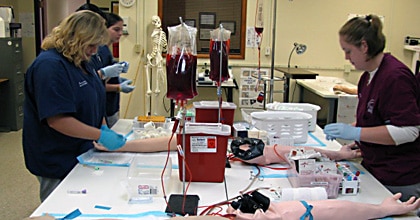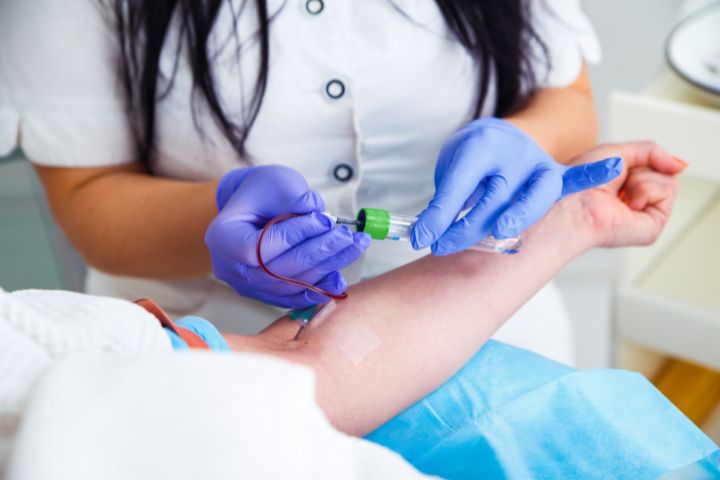Why More Students Are Choosing a Phlebotomy school Right Now
Wiki Article
The Path to Qualification: Recognizing the Phlebotomy Educating Training Course Trip and Its Relevance
As you take into consideration the path to qualification in phlebotomy, it's essential to comprehend the function you'll play in health care. Your training will certainly cover necessary skills, from blood collection methods to patient interaction.
The Duty of Phlebotomists in Medical Care
Phlebotomists play a vital function in the medical care system, functioning as the vital web link in between patients and vital diagnostic screening. You'll execute blood draws, making certain examples are collected properly and securely. Your knowledge assists in identifying medical conditions, monitoring wellness, and directing treatment decisions.In your daily interactions, you'll require to develop depend on with people, making them really feel comfy during what might be a demanding experience. You are accountable for identifying and taking care of examples carefully to stop contamination or errors, which can affect examination outcomes.
Beyond this, you'll commonly function along with physicians and registered nurses, communicating vital information about clients' conditions. Your function is essential in maintaining the operations in healthcare setups, ensuring prompt and precise outcomes. By understanding your abilities, you add meaningfully to individual care, making you an essential part of the medical group. Welcoming this responsibility is vital to your success as a phlebotomist.
Review of Phlebotomy Training Programs
When exploring phlebotomy training programs, you'll discover various kinds developed to fit different schedules and finding out designs. Each program helps you establish necessary abilities like blood collection and individual interaction. Understanding these alternatives is crucial to choosing the right path for your profession.Kinds Of Educating Programs
Several kinds of training programs are available for those looking to become proficient in phlebotomy. Furthermore, some health centers and centers provide on-the-job training programs, giving useful experience while you find out. Whatever course you pick, each program intends to furnish you with the required abilities for an effective phlebotomy occupation.
Trick Abilities Developed
Grasping phlebotomy needs a set of key abilities that are established through extensive training programs. You'll learn technological skills like correct vein choice, needle insertion, and blood collection methods. These hands-on techniques ensure you can do treatments securely and successfully. Additionally, communication skills are essential; you'll require to interact with people, explain procedures, and put them at ease. Comprehending makeup and physiology is vital, as well, as it aids you find capillaries and understand the body's feedback to blood attracts. You'll gain knowledge of security methods and infection control, ensuring you preserve a sterilized atmosphere. Each of these skills is vital for your success as a licensed phlebotomist, making you a useful asset in any health care setting.Trick Components of a Phlebotomy Course
In a phlebotomy training course, you'll concentrate on important topics that prepared for your future job. You'll take part in hands-on training that allows you to apply what you've found out in real-world settings. Both the curriculum and practical experience are crucial for your success as a phlebotomist.Core Curriculum Summary
While seeking a phlebotomy training course, you'll run into a core curriculum designed to equip you with fundamental abilities and knowledge. Phlebotomy Classes Near Me. This curriculum usually consists of makeup and physiology, focusing on the blood circulation system and recognizing blood elements. You'll also learn about various sorts of blood collection methods, including venipuncture and capillary puncture techniquesFurthermore, infection control and security methods are necessary parts, guaranteeing you understand just how to maintain a sterilized atmosphere. You'll examine patient interaction, emphasizing communication and empathy, which are essential for relieving person anxiety. Finally, moral and legal considerations will be attended to, preparing you for real-world responsibilities. This foundational understanding will enable you to excel as a phlebotomist and offer top quality care in professional setups.
Hands-On Training Experience
Obtaining hands-on experience is an indispensable component of your phlebotomy training course. This functional training permits you to use what you have actually learned in a real-world setup, boosting your abilities and confidence. You'll exercise venipuncture methods, discover exactly how to deal with different sorts of specimens, and obtain accustomed to the equipment made use of in the field. Under the guidance of skilled instructors, you'll refine your skills, ensuring you're planned for any kind of situation you could encounter.In addition, you'll obtain the chance to interact with patients, which is essential for establishing your communication abilities. This mix of technical proficiency and social abilities is vital for your success as a certified phlebotomist. Inevitably, hands-on training is where concept meets method, solidifying your understanding and readiness for accreditation.
Certification and Licensing Demands
Before you can begin your job in phlebotomy, it is vital to comprehend the certification and licensing needs that vary by state. Many states call for phlebotomists to hold an accreditation from an identified organization, such as the National Phlebotomy Organization or the American Society for Clinical Pathology. These qualifications generally involve passing an exam that evaluates your understanding and abilities in the area.Along with accreditation, some states have certain licensing needs. You may need to finish a specific variety of hours in medical technique, send evidence of training, or go through a history check. It is very important to research your state's policies to ensure you satisfy all necessary criteria.
Remaining notified about these demands not only aids you protect a placement but also enhances your integrity as an expert. By satisfying these demands, you'll be well on your way to an effective career in phlebotomy.
Hands-On Training and Practical Experience
Hands-on training and practical experience are important components of your phlebotomy education, as they permit you to apply academic understanding in real-world situations. Throughout your training, you'll engage in monitored venipuncture, discover correct methods, and come to be accustomed to various blood collection tools. This direct participation is essential for building your self-confidence and sharpening your abilities.You'll function carefully with skilled specialists that can assist you via the subtleties of individual communication and sample handling. Each practice not only strengthens your understanding however likewise prepares you for the fast-paced environment of healthcare settings.
Additionally, lots of programs integrate medical turnings, allowing you to experience varied settings, from healthcare facilities to outpatient facilities. This exposure assists you adjust to home different difficulties and client requirements, guaranteeing you're well-prepared for your future duty. Embrace these opportunities, as they're important to becoming an experienced and caring phlebotomist.
Difficulties Faced Throughout Training
While gaining hands-on experience is essential, it is very important to acknowledge the challenges that can occur during your phlebotomy training. You might run into anxiety when doing procedures on actual clients, particularly if you're brand-new to the atmosphere. The stress to obtain everything right can be overwhelming. Additionally, understanding the abilities required for blood draws takes practice; you might battle with method initially.Time management can likewise be a hurdle, as balancing concept, useful sessions, and individual dedications can really feel challenging. You might face differing finding out paces among your peers, causing sensations of insecurity if you think you're falling back. Adapting to the different individualities of instructors can be tough, as each may have a distinct teaching style.
Identifying these barriers early on can prepare you for success and aid you create durability throughout your training trip.
Job Opportunities After Qualification

As you gain experience, you may even consider focusing on locations like pediatric or geriatric phlebotomy, accommodating certain client needs. Some phlebotomists choose to progress their careers by ending up being research laboratory professionals or pursuing further education in medical care areas.
In addition, your certification can result in roles in training or overseeing new phlebotomists, enabling you to share your knowledge. With the healthcare sector consistently expanding, your abilities will constantly remain in need, leading the way for a secure and fulfilling career. Embrace the opportunities awaiting you!
Regularly Asked Questions
What Is the Normal Period of a Phlebotomy Educating Training Course?
Phlebotomy training courses typically last around four to 8 weeks. You'll engage in hands-on practice, classroom instruction, and on-line discovering. Finishing this training prepares you for qualification and a gratifying job in health care.Are Online Phlebotomy Courses Available?
Yes, on-line phlebotomy training courses are offered. They provide adaptability and ease, allowing you to examine at your own speed. Just verify the program is accredited to meet accreditation requirements and get beneficial skills for your job.How Much Does Phlebotomy Training Typically Expense?
Phlebotomy training generally sets you back in between $700 and $2,500, depending upon the program and area. You ought to consider variables like course size, included products, and hands-on experience sites when choosing the best training for you.What Prevail Prerequisites for Phlebotomy Training?
Common prerequisites for phlebotomy training typically include a high institution diploma or GED, immunizations, and a background check. Some programs may also need fundamental medical care expertise or qualifications, guaranteeing you're planned for hands-on training.Can I Function While Finishing My Phlebotomy Training?
Yes, you can work while finishing your phlebotomy training. Lots of trainees balance tasks with their researches, yet make company website sure to manage your time efficiently to ensure you satisfy both work and training commitments successfully.Report this wiki page